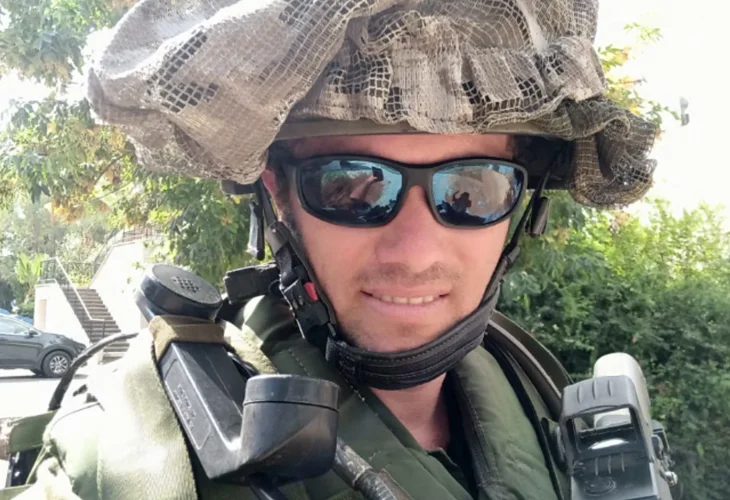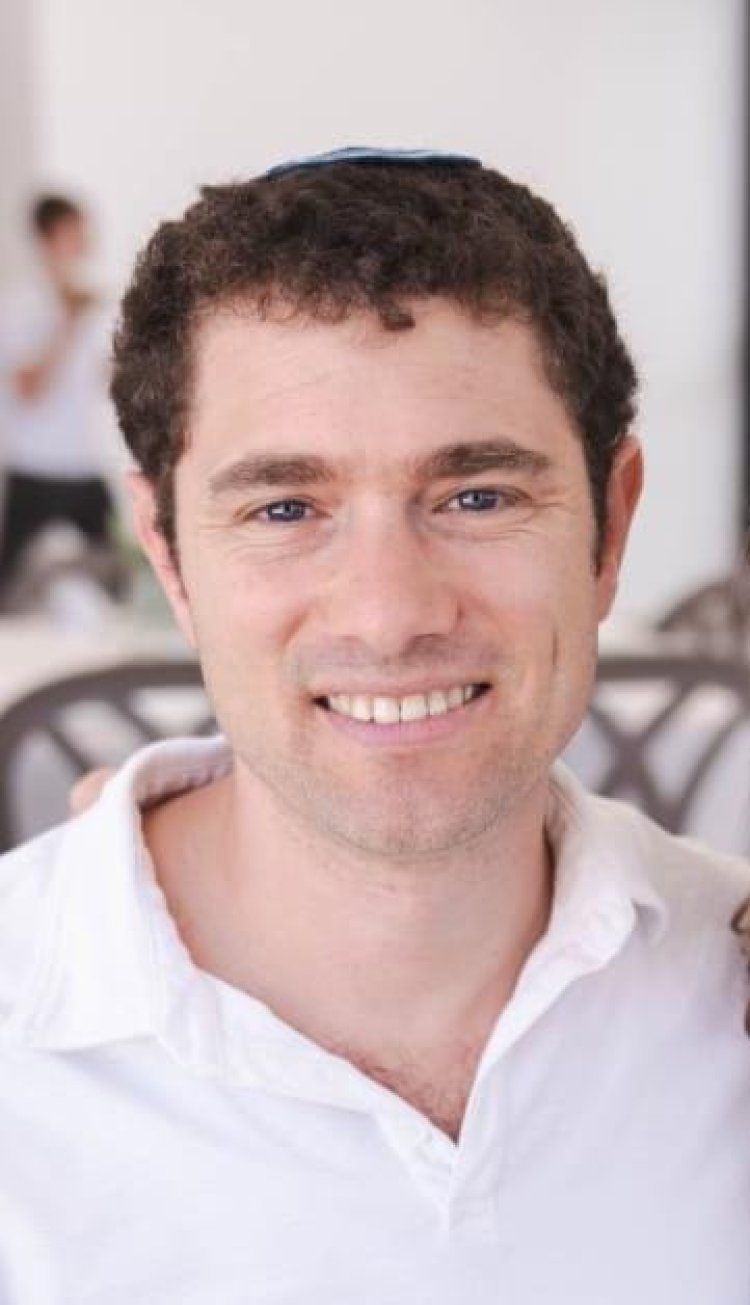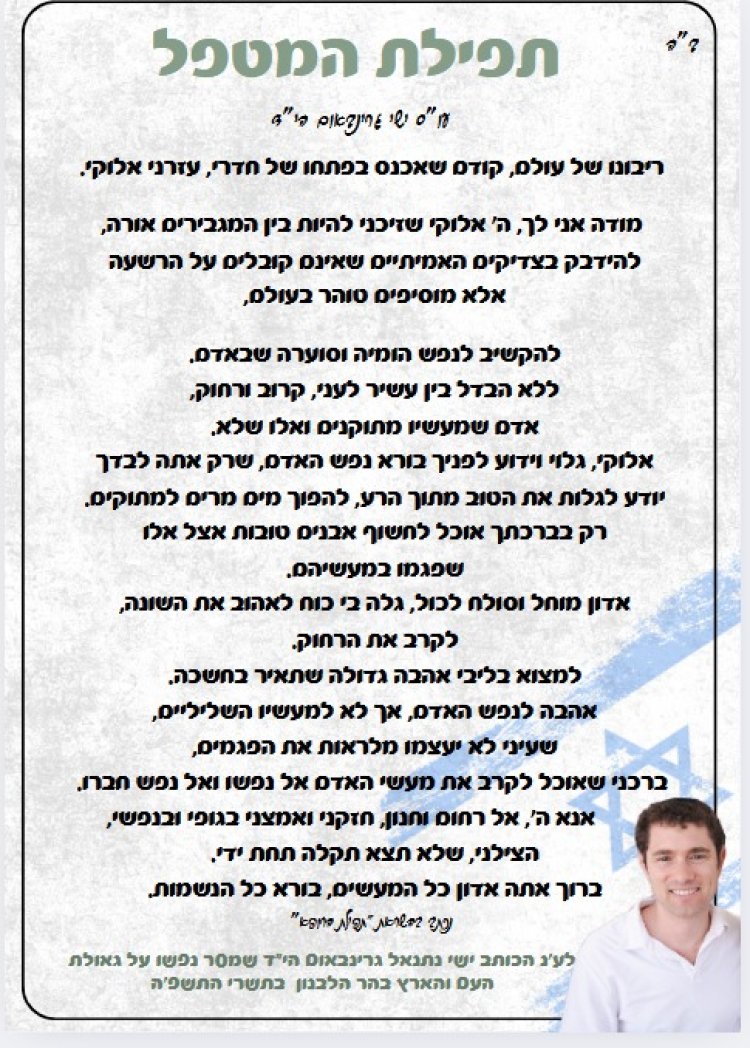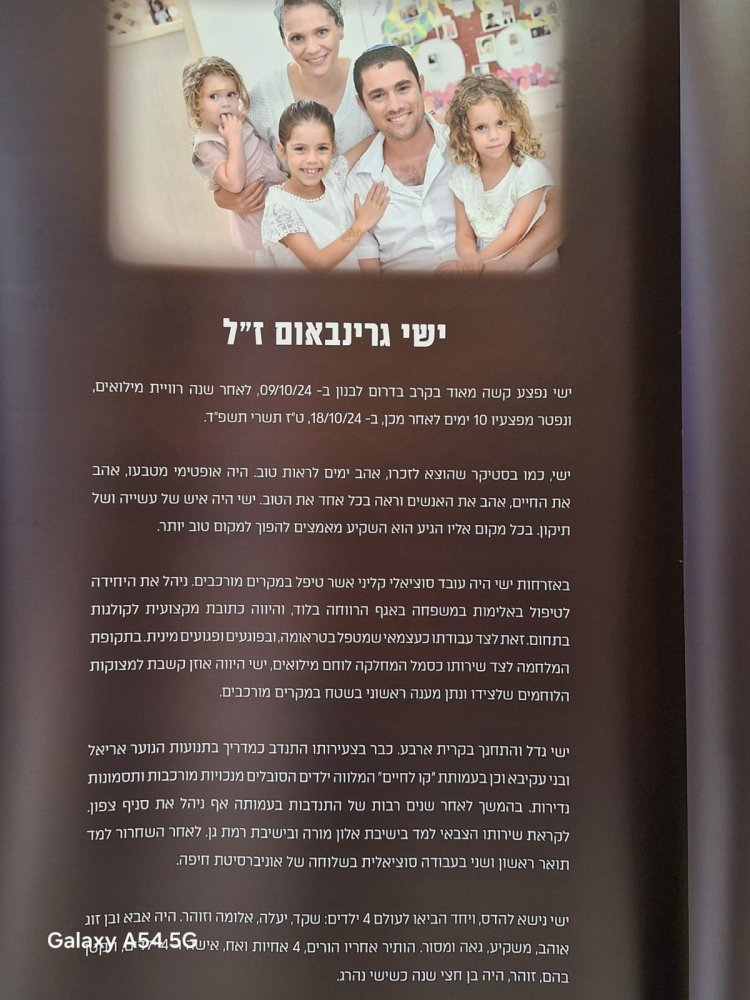A Legacy of Kindness: Remembering the Life of Yishai Greenbaum
Yishai Greenbaum wore many hats in his lifetime—social worker, army sergeant, devoted father, and community leader. His mother, Tobi, shares memories of her son and his enduring impact. "He simply aimed to do good," she reflects.
 Sergeant Yishai Greenbaum z"l
Sergeant Yishai Greenbaum z"l"From a young age, Yishai loved to help others; it was simply his passion," recalls Tobi Greenbaum, mother of Sergeant Yishai Greenbaum, who gave his life earlier this year in a battle in Lebanon at the age of 38.
"As a young boy, Yishai volunteered with various organizations such as 'Lev L'chaim'—a group dedicated to children with special needs. He always kept a lookout for those around him, seeking out those who needed assistance, people others might overlook, yet he saw them."
"Throughout his life, Yishai followed a very typical path," his mother explains, "He studied in institutions in Kiryat Arba, moved on to the yeshiva in Elon Moreh, and later to the Yeshiva in Ramat Gan with Rabbi Yehoshua Shapira before enlisting in the IDF through a hesder program, serving at a slightly older age than usual. He advanced to a commander's course and specialized in a weapon called 'Negev,' where he also trained new recruits. Even in the army, when he became a sergeant, people who met him shared that he never gave up on them and always saw beyond the surface. For example, an officer told us about how when he enlisted, Yishai was his commander. His parents were going through a divorce, and he was shattered and wanted to leave the army. 'But Yishai never gave up on me, supporting me constantly,' he said. 'He saved my life.' We continued hearing these stories throughout his time in the military, until he was severely injured and killed, because as I mentioned—he always loved to help, wanted everyone to be well, and truly understood each person's needs."
 Sergeant Yishai Greenbaum z
Sergeant Yishai Greenbaum zFacing the Toughest Challenges
It's no surprise that Tobi tells us that after finishing his army service, Yishai chose to study social work. Around that time, he married his wife, Hadass, and when he got a job as a clinical social worker for the Lod city municipality, they moved there and became part of the local religious community.
"Throughout the years, Yishai chose to work in the most challenging field—domestic violence," says his mother. "He led various groups, and in his final two years, he managed the domestic violence department, being responsible for women, children, and even men. He was called to emergency cases and worked six full days a week, on-call even during Shabbat."
"During this period, they had four children—Shaked, now nine, Ya'ala, six, Aluma, four, and little Zohar who barely got to know Yishai as he was only five months old when Yishai was killed."
Yishai, according to Tobi, was drafted right away when the war began and served the entire time in the northern sector. "He was drafted as a company sergeant," she explains, "but alongside the military role, he found himself acting as a social worker, caring for the soldiers' mental health—a challenging task. Additionally, he was very strong in his observance, and his soldiers looked at him as their company rabbi. He was the one who lit the Chanukah candles, kept Shabbat strictly, and everyone knew they could rely on him. So it happened that he served in many roles simultaneously but never made a big deal about what he was doing. He always took on tasks with joy, performing them naturally."
"This was also evident in the community in Lod; for instance, when Yishai noticed children getting bored in the synagogue on Shabbat, he organized 'children's prayers' after the service, bringing along a puppet to tell them the weekly Torah portion naturally, refusing thanks, stating, 'What have I actually done?'"
"I am also a social worker by profession, for 45 years," adds Tobi, "and I can attest firsthand that Yishai took on the toughest cases, including opening a clinic for children harming other children. It's hard and frustrating work with these kids, but Yishai believed in rehabilitation, understanding the deeper issues behind it, because children who harm often have been harmed themselves."
"Yishai always worked to create change from within, drafting protocols for women exiting shelters, advising them on how to manage and organize. He also prepared emergency kits for those being abruptly relocated to shelters, going above and beyond his role."

A Leader in Many Forms
Tobi shares that Yishai was a devoted father to his daughters, emphasizing the girls because after little Zohar was born, he was rarely home, and when he was killed in the war, Zohar was just five months old. "But to his daughters, he was the most dedicated dad," she recalls, "making time to be with them, going on trips, and having fun as he liked to call it."
And what about his experiences during the war while serving in reserves?
"Yishai's time during reserve duty was very challenging and tough," his mother recounts, "In fact, from the start of the war, he was stationed in the northern sector, sleeping in groves and forests with his soldiers, concealed. Soldiers in such situations need a lot of motivational talks, and Yishai provided just that without pause. His friends told me about one particularly cold day when he announced: 'This Shabbat we are making cholent.' It was not simple, as making cholent required a gas tank that risked revealing their position, but Yishai secured the necessary approvals and prepared the cholent, explaining to his commanders, 'The soldiers need their Shabbat delight.'"
"As I mentioned, emotionally he supported them all the time, and after an incident where a mortar shell fell right near them, he recognized that some of them were traumatized and gathered them in a circle, providing the necessary psychological aid through constructive group discussions."
"But the most intriguing thing is that during the reserves, he kept thinking of his job, corresponding via emails with the office workers, answering questions and solving problems. One of the workers shared with us during the shiva, 'Two days before he was injured, he solved an emergency shelter issue for a woman in severe distress.'"
When did you last see Yishai?
"We spent the last Rosh Hashanah at our daughter’s home in the Golan Heights, and on the eve of the holiday, Yishai called her, mentioning that they had an exercise near her village. She immediately told him: 'Call me when you’re nearby, and I'll come out with a pot of soup.' This phone call came half an hour before the holiday, and my daughter went out to the soldiers, with my husband joining her at the last minute. They met Yishai, and as always, he didn’t take any soup for himself until all his soldiers had their share. My husband had the chance to sit with him over a cup of soup, capturing their last moment together in a picture. On Shabbat, Yishai was in a shelter in Kiryat Shmona with the soldiers, and during the Motzei Rosh Hashanah, when I spoke with him, he expressed for the first time since the war began that it was 'very hard for him,' which was unlike him as he never complained."
"That week, on Monday, they entered Lebanon, and by Wednesday he was severely injured but stabilized, evacuated by military helicopter from the field to Rambam Hospital. He was unconscious, and we sat by his side for ten days, learning that the main injury was to his brain, damaged by shrapnel, possibly undergoing a slow brain death. On the eve of Shabbat Chol Hamoed Sukkot, we said our final goodbye, and since Yishai had signed an organ donor card before joining the army, he donated five organs, granting him the opportunity to save lives as his last mission."

Carrying on His Goodness
What is life like now without Yishai? How do you manage to move forward?
"We strive to live and do as much good as possible in his memory, understanding that this is his most accurate legacy," Tobi explains. "Last week would have been his birthday, and we considered how to mark it. We decided to visit residences for people with special needs and celebrate with them, spreading joy. We brought a special musician, yeshiva students to dance, hats, snacks, and held a Purim-party-like celebration doubling as a birthday. At the end, one young man said, 'Next year, Mashiach will come, and Yishai will be with us again.' That's when I realized that despite his limitations, he understood what many around us do not—celebrating and bringing joy to others allows us to feel Yishai’s continued legacy and helps us keep spreading light as he did."
What would you like all of us to learn from Yishai's life?
"To learn to see the invisible people and think about how to make them happy," she answers without hesitation. "Yishai would greet the security guard every morning and also the cleaning staff, bringing them gifts on Purim, and when he visited a restaurant, he remembered to thank the waitress and, if possible, glanced into the kitchen to thank the chef. He always noticed the people most of us don’t see and knew how to appreciate them."
"A woman who came to comfort us shared that she volunteered with Yishai at 'Lev L'chaim’ during her service year, and at one point she confessed to him that she found it hard to work with special needs children. Yishai advised her: 'Look at their soul; they have a pure soul, and that way you can connect with them.' That is exactly what we all need to learn—to look at the internal and not the external of those around us, even if they aren’t at our level or look different. May we be blessed to achieve this."

